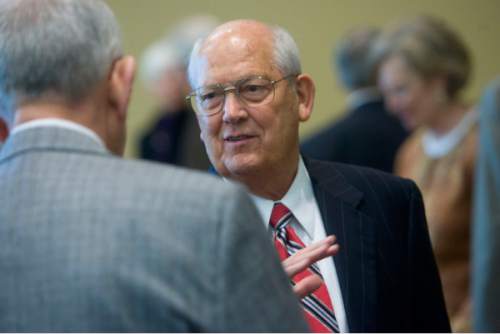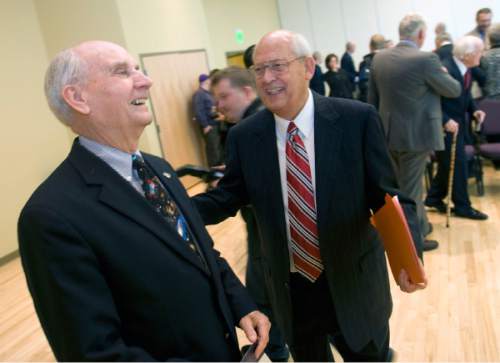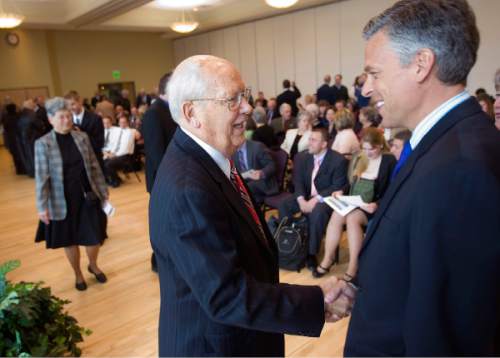This is an archived article that was published on sltrib.com in 2015, and information in the article may be outdated. It is provided only for personal research purposes and may not be reprinted.
Richard Richards, a key player in Utah Republican politics for three decades, was the first GOP chairman to endorse Ronald Reagan for president and was instrumental in Reagan's successful presidential campaign in 1980.
An Ogden native who rose to become chairman of the National Republican Committee in Reagan's first term, Richards died at his home Friday. He was 82.
"I knew Dick since 1970," said longtime Republican strategist Dave Hansen. "He was not only a very bright political operative, he was a good person. Family, community and his church meant everything to him. He had the ability to keep politics in perspective.
Richards became interested in Republican politics when he was a student at Weber Junior College in the early 1950s.
After he was drafted into the U.S. Army and served as a 2nd lieutenant during the Korean War, he enrolled in law school at the University of Utah where he served as chairman of the Utah Young Republicans.
While practicing law in Ogden, he worked on the successful congressional campaigns of Douglas Stringfellow, Henry Aldous Dixon and Laurence Burton, to whom he served as a legislative and administrative assistant in Washington, D.C., for two years.
He served three terms as chairman of the Utah Republican Party and in 1976 led the Utah delegation into prominence by being the first to endorse Reagan against incumbent Republican President Gerald Ford at the GOP National Convention.
Richards served on Reagan's presidential campaign committee while chairman of the Utah Republicans and was the Western states coordinator for the Reagan campaign in 1980, when Reagan upset incumbent Democratic President Jimmy Carter.
Richards' work on Reagan's campaign earned him the chairmanship of the National Republican Committee in 1981-82.
"Dick Richards was one of the great Republicans in Utah," said former Gov. Norm Bangerter. "He was a man of integrity and a great leader. He was a humble guy, but he was not afraid to take a stand if he thought it was the right thing to do."
"One thing I appreciated about Dick was his candor and his honesty," said former Sen. Jake Garn. "If you asked him a question, you always got a straight answer. No gimmicks. No games."
Former U.S. Rep. Jim Hansen remembered when Reagan was running for president and Richards invited him to speak at the Utah Republican convention. "Reagan went on for quite a while when the [convention chairman] finally tried to cut him off," Hansen said. "Dick was not going to let anyone disrespect Ronald Reagan and he rushed down to the front of the convention hall to confront the chairman. It was quite a scene. Reagan actually got a kick out of it."
When Richards was state Republican chairman in 1976, he was asked why his party's candidate for governor, Vernon Romney, was doing so poorly in the polls since he was widely known as the two-term incumbent attorney general and his Democratic opponent, Scott Matheson, was virtually unknown.
"Vern is not a show horse," Richards dead-panned. "He's a workhorse and too often that gets unnoticed."
The workhorse vs. showhorse analogy became a rhetorical gem in Utah political circles after that.
"Dick Richards was a great friend, a cherished mentor, and a wonderful human being," said Sen. Orrin Hatch," who was an unknown political novice in 1976 when he won his first term in the Senate under the chaimanship of Richards. "I often trusted and relied on his analytical mind and sage wisdom for which he was so widely respected and admired. Dick's impact on Utah will be felt for generations to come."
"I am saddened by the news of Dick Richards' passing," said Gov. Gary Herbert. "He was a good man and a strong Republican leader who had a significant impact on this country."
Besides his political work, Richards served as chairman of the board of trustees at Weber State University and established the Richard Richards Institute on Ethics. He also held many positions in his local wards and stakes of The Church of Jesus Christ of Latter-day Saints. He is survived by his wife Annette, five children, 11 grandchildren, 15 great-grandchildren, a brother and six sisters.
Funeral services will be at 11 a.m. Feb. 7, at 11 a.m. in the LDS chapel at 5161 S. 1300 East, South Ogden. Viewings will be held Friday from 5 p.m. to 8 p.m. at Meyers Mortuary, 845 Washington Blvd. in Ogden, and at the church from 9:30-10:30 a.m. prior to the funeral.







